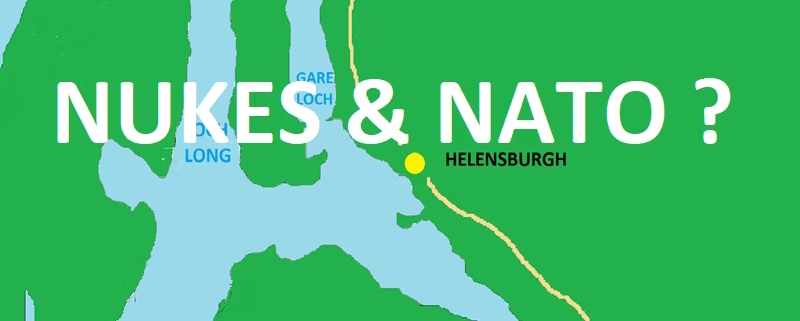Scotland, Nukes and NATO
In recent days there has been a flurry of attacks on the Scottish National Party about a mismatch between its No Nuclear Weapons stance and the proposed membership of NATO if and when Scotland achieves independence.
Let’s begin with NATO itself. An independent Scotland which joined the North Atlantic Treaty would be taking its policy cues from Washington and from European NATO hawks, as part of the Euro-Atlantic bloc in the continuing Cold War. It should instead be genuinely independent and adopt a neutral stance, registering its solidarity with other non-aligned states. The Scotland’s For Peace Covenant has put it well; “We desire that Scotland should be known for its contribution to peace and justice rather than being a launch pad for waging war.” With this perspective, and taking into account how nuclear weapons are core to NATO’s strategic concept, membership for a new nation looks incompatible with a genuine rejection of nuclear weapons.
The US proudly describes its “nuclear umbrella” as its “extended deterrence” – so its nukes (and the threat of them) are not just to defend the US but are ready to “protect” others states. Among the US “umbrella ” states are the members of NATO, South Korea, and Japan. What makes this umbrella poisonous? One toxin is the real uncertainty that the umbrella would in fact be in place if there was real danger, an actual attack, conventional or nuclear. How much trust can reasonably be placed in a world power which puts its own interests first? The second toxin is based on how the umbrella offer is used to keep client states in line – a sort of protection racket. But it is the third element in the venom that is most deadly. A nation that welcomes the proffered umbrella accepts that nuclear weapons may be used on its behalf and thus could become party to mass murder and, potentially, a global catastrophe.
The accepted position is that being a NATO state puts you under this umbrella. Two weeks ago the PM of new NATO state Finland confirmed the concept: “I would start from the premise that we in Finland must have a real nuclear deterrent, and that’s what we have, because NATO practically gives us three deterrences through our membership. The first is military, i.e. soldiers, the second is missiles, i.e. ammunition, and the third is a nuclear deterrent, which comes from the United States, “.
There is however another strand. People advocating for the TPNW in some European NATO states are regularly told that the Treaty on the Prohibition of Nuclear Weapons (TPNW) cannot be signed by the state since it is a NATO state. They counter that the current nuclear NATO Strategic Doctrine is not intrinsic to the North Atlantic Treaty and there are no basic legal barriers to NATO states signing and ratifying the TPNW, though it would mean the end of any “nuclear sharing” and a renunciation by the state in question of any dependence on the nuclear arsenal of another state for their security. Scottish disarmament campaigners acknowledge that this is a reasonable tactic in European NATO states.
In Scotland – and with a general election looming – the challenge to the SNP must be as follows: “If your rejection of nuclear weapons is genuine then your first priority for an independent Scotland must be accession to the TPNW with a full understanding of its radical nature, including rejection of the nuclear umbrella and recognition that States Parties to the Treaty must not: ‘Assist, encourage or induce, in any way, anyone to engage in any activity prohibited to a State Party under this Treaty.’” (Article 1:e).
This is why Scottish disarmament campaigners will be asking all Westminster election candidates whether they will commit to signing the ICAN Parliamentarians’ Pledge in Support of the TPNW. We also need to point out that if Scotland accedes to the TPNW the removal of nuclear weapons from our land and seas is not primarily to be negotiated with the remnant UK. It will be a matter for the UN and the other States Parties to the TPNW all around the world. This puts us in a very strong position to face down the inevitable dirty tricks, bribery and squalid dealing. Further, an early accession to the Treaty will significantly determine our relations with other nations and alliances. It is essential that we give the Treaty predominance within the independence process.




